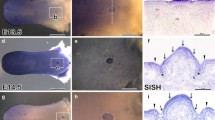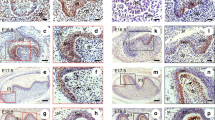Abstract
Tongue epithelium continuously turns over in adults. Our previous study showed that epidermal growth factor and fibroblast growth factor-2 stimulated proliferation of KT-1 cells derived from tongue epithelium, suggesting that these signals serve as positive regulators for tongue epithelial proliferation. To investigate a negative regulation of tongue epithelial cell proliferation, we studied effects of transforming growth factor-β (TGF-β) on KT-1 cells. Proliferation assays showed that TGF-β inhibited proliferation of KT-1 cells in a dose dependent manner. Cell-cycle analysis showed that TGF-β induced G0/G1 cell cycle arrest in KT-1 cells. We also examined expressions of Ink4 and Cip/Kip family mRNA by quantitative reverse transcription-polymerase chain reaction. We found that TGF-β induced p15Ink4b and p21Cip1 mRNA expressions. These results strongly suggest that G0/G1 cell cycle arrest is associated with increased p15Ink4b and p21Cip1 expressions. Moreover, p21Cip1 mRNA was localized in suprabasal cells of tongue epithelium, suggesting that p21Cip1 play a role in cell-cycle exit along with tongue epithelial differentiation. Taken together, our results suggest that TGF-β signaling serves as negative regulator of tongue epithelial cell proliferation, and may control tongue epithelial cell differentiation through modulating expression of p21Cip1.




Similar content being viewed by others

References
Cheifetz S, Hernandez H, Laiho M, Ten Dijke P, Iwata KK, Massague J (1990) Distinct transforming growth factor-beta (TGF-beta) receptor subsets as determinants of cellular responsiveness to three TGF-beta isoforms. J Biol Chem 265:20533–20538
Chen Z, Li DQ, Tong L, Stewart P, Chu C, Pflugfelder SC (2006) Targeted inhibition of p57 and p15 blocks transforming growth factor beta-inhibited proliferation of primary cultured human limbal epithelial cells. Mol Vis 12:983–994
Di Cunto F, Topley G, Calautti E, Hsiao J, Ong L, Seth PK, Dotto GP (1998) Inhibitory function of p21Cip1/WAF1 in differentiation of primary mouse keratinocytes independent of cell cycle control. Science 280:1069–1072
Ding QM, Ko TC, Evers BM (1998) Caco-2 intestinal cell differentiation is associated with G1 arrest and suppression of CDK2 and CDK4. Am J Physiol 275:C1193–C1200
Fan L, Girnius S, Oakley B (2004) Support of trigeminal sensory neurons by nonneuronal p75 neurotrophin receptors. Brain Res Dev Brain Res 150:23–39
Hamamichi R, Asano-Miyoshi M, Emori Y (2006) Taste bud contains both short-lived and long-lived cell populations. Neuroscience 141:2129–2138
Hirota M, Ito T, Okudela K, Kawabe R, Hayashi H, Yazawa T, Fujita K, Kitamura H (2001) Expression of cyclin-dependent kinase inhibitors in taste buds of mouse and hamster. Tissue Cell 33:25–32
Massague J, Gomis RR (2006) The logic of TGFbeta signaling. FEBS Lett 580:2811–2820
Massague J, Blain SW, Lo RS (2000) TGFbeta signaling in growth control, cancer, and heritable disorders. Cell 103:295–309
Missero C, Di Cunto F, Kiyokawa H, Koff A, Dotto GP (1996) The absence of p21Cip1/WAF1 alters keratinocyte growth and differentiation and promotes ras-tumor progression. Genes Dev 10:3065–3075
Miura H, Kusakabe Y, Sugiyama C, Kawamatsu M, Ninomiya Y, Motoyama J, Hino A (2001) Shh and Ptc are associated with taste bud maintenance in the adult mouse. Mech Dev 106:143–145
Nakamura S I, Kawai T, Kamakura T, Ookura T (2010) TGF-beta3 is expressed in taste buds and inhibits proliferation of primary cultured taste epithelial cells. In Vitro Cell Dev Biol Anim. doi:10.1007/s11626-009-9239-9
Ookura T, Kawamoto K, Tsuzaki H, Mikami Y, Ito Y, Oh SL, Hino A (2002) Fibroblast and epidermal growth factors modulate proliferation and neural cell adhesion molecule expression in epithelial cells derived from the adult mouse tongue. In Vitro Cell Dev Biol Anim 38:365–372
Piek E, Heldin CH, Ten Dijke P (1999) Specificity, diversity, and regulation in TGF-beta superfamily signaling. Faseb J 13:2105–2124
Rangarajan A, Talora C, Okuyama R, Nicolas M, Mammucari C, Oh H, Aster JC, Krishna S, Metzger D, Chambon P, Miele L, Aguet M, Radtke F, Dotto GP (2001) Notch signaling is a direct determinant of keratinocyte growth arrest and entry into differentiation. EMBO J 20:3427–3436
Sherr CJ, Roberts JM (1999) CDK inhibitors: positive and negative regulators of G1-phase progression. Genes Dev 13:1501–1512
Siegenthaler JA, Miller MW (2005) Transforming growth factor beta 1 promotes cell cycle exit through the cyclin-dependent kinase inhibitor p21 in the developing cerebral cortex. J Neurosci 25:8627–8636
Sun H, Oakley B (2002) Development of anterior gustatory epithelia in the palate and tongue requires epidermal growth factor receptor. Dev Biol 242:31–43
Suzuki Y, Mizoguchi I, Uchida N (2007) Detection of neurotrophic factors in taste buds by laser capture microdissection, immunohistochemistry, and in situ hybridization. Arch Histol Cytol 70:117–126
Tian JQ, Quaroni A (1999) Involvement of p21(WAF1/Cip1) and p27(Kip1) in intestinal epithelial cell differentiation. Am J Physiol 276:C1245–C1258
Acknowledgments
The authors express their gratitude to Dr. Yuko Kusakabe, Dr. Takayuki Kawai, Ms. Yumiko Ito, Mr. Takeshi Ebihara, Ms. Mariko Kobayashi, Ms. Hiromi Kato, and Ms. Yuriko Hino for their help in the experiments and to the members of the Kamakura-laboratory for helpful discussions. We also thank Dr. Shigeru Yasumoto for numerous and valuable discussions. This work was financially supported by the National Food Research Institute and Japan Science and Technology Agency.
Author information
Authors and Affiliations
Corresponding author
Rights and permissions
About this article
Cite this article
Nakamura, Si., Kamakura, T. & Ookura, T. Tongue epithelial KT-1 cell-cycle arrest by TGF-β associated with induction of p21Cip1 and p15Ink4b . Cytotechnology 61, 109–116 (2009). https://doi.org/10.1007/s10616-010-9251-7
Received:
Accepted:
Published:
Issue Date:
DOI: https://doi.org/10.1007/s10616-010-9251-7



